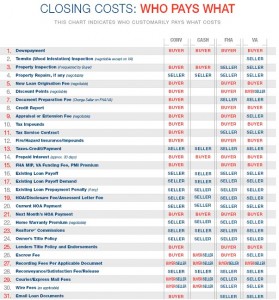Posts Tagged ‘homebuyer advice’
Most Often Asked Homebuyer Questions – Answered!

Buying a home is a major lifestyle and investment decision. Homebuyers have a lot of questions throughout every step of the process and I have found that many of the questions are common to many. Here are some answers to the most common questions I get asked.
Q: What home can I afford?
That depends, of course-on your income and other financial obligations. There are many Home Affordability Calculators for a ballpark figure. A visit to the Optima Properties website will offer you many tools under the Finance Center!
Before you start to shop, make sure that you know exactly what you can afford by getting pre-qualified by your financial institution of mortgage broker.
Q: Can I buy a home and sell my current one at the same time?
Yes, you can-but it’s the real estate equivalent of walking a tightrope. This is one of the trickiest questions to answer, on the one hand, if you buy a home before you sell the one you’re in, you’re overextended financially; if you sell before you buy, you might need to rent a while before finding a new place. There are ways to do both at once, and one option is to request a “sale contingency” in your contract. This means you only agree to buy a home if you can sell the one you’re in. The only downside is if your seller doesn’t agree and will not agree to this condition….it never hurts to ask!
Q: How many homes should I see before making an offer?
As many as you need to! While home shoppers these days can look at hundreds of homes online, most need to physically visit the area and stand in the properties before they put in an offer. Keep in mind, this varies tremendously for each person. Some people find their home within hours of looking or make an offer sight unseen because they have definitively defined their criteria. For others, it takes months and sometimes over a year if they are trying to determine the area, lifestyle, and type of home that meets their requirements.
Q: What do you think the seller will accept as a fair price?
As a rule of thumb, knocking 5-10% off the list price
won’t ruffle any feathers for an initial offer. If the property has been sitting on the market for months, you can venture below that, but the bottom line is, you never know how low a seller will go, as they have different motivations for selling. Your Exclusive Buyer Agent should develop a Comprehensive Market Analysis to determine the market value of the property. This should be your guideline as to how much to offer and how high to go.
Q: How do I know if the property is a good deal?
While there’s no crystal ball on whether a certain home is a bargain and will appreciate, rest assured that with research, you can keep surprises to a minimum. The best way is to check out comps-what similar properties are selling for in the area.
Q: How quickly can I close?
If you are paying cash you can typically close in the time it takes to get the home inspected and have a lien, permit, and title search conducted. The new TRID requirements for home loans have extended the time required to get a mortgage. I advise all my buyers to not commit to a closing for less than 60 days from the effective date of the contract.
Q: Should I get a home inspection?
My only answer to this question is YES, YES, YES! A certified and licensed home inspector ( not your father in law) will look into the condition of the roof, electricity, heating and air, plumbing, among other functions and conditions of the property. Even if you are just purchasing land you should check for soil contamination, septic perkability, etc.
Q: Can I back out if I change my mind?
While buyers can always back out of a deal, doing so without good reason may forfeit their earnest money and full deposit. The form of contract you choose to use may provide you with different outs. Contingencies are great “escape clauses. For example, if you enter into an AS IS contract upon an unsatisfactory home inspection, the buyer can ask for their deposit back. Another contingency is “subject to appraisal.’” That means you can back out if the appraisal either ordered by your closing agent or your lender results in a valuation that is less than the agreed to purchase price.
Bear in mind that the more contingencies you include in your offer the less room you have to negotiate other terms and conditions of the contract with the Seller.
There is not question to small or unimportant when purchasing a home. There is a wealth of information available and your agent should assist you in getting your questions answered in a timely manner.
Why Fla. is the Best State for Retirement

Sunshine, beaches and a laid-back lifestyle have made Florida one of the top destinations for retirees looking to live out their golden years in peace and comfort.
Now a new study from WalletHub.com has named the Sunshine State the best place in the U.S. to retire based on its affordability, quality of life and healthcare. The website pointed out that nearly a third of non-retirees have no retirement savings or pension and said it made its choices to help retirees find the states that offered the most bang for their buck.
Rounding out the top five for 2016 after Florida were Wyoming, South Dakota, South Carolina and Colorado.
At the bottom? Vermont, Connecticut, Hawaii, Washington D.C. and Rhode Island.
Here are the top six reasons why Florida is the best place to retire, according to WalletHub.
Hole in one!
From Seminole Golf Course in Juno Beach (the state’s top ranked links, according to GolfDigest) to Trump National Doral, Florida has the most golf courses per capita in the nation.
Company
Looking for new friends? You won’t be lonely in the Sunshine State, which has the highest percentage of people aged 65 or over of any state.
Out on the town
It’s not Broadway, but theatergoers in Florida have more and better options than ever before. The state has the sixth-most theaters per capita in the U.S.
Help at home
The cost of hiring a nurse and other in-home help can break the bank for many seniors. But Florida has the eighth-lowest cost of in-home services of any state.
Low taxes
Many retirees don’t realize they may need to pay federal and state taxes on Social Security income and withdrawals from IRA and 401(k) funds. Florida’s low taxes make it the 10th-best state for retirees come tax season, according to WalletHub.
A night at the museum
Miami’s burgeoning cultural scene means locals don’t have to travel to New York for their museum fix. From the Pérez Art Museum Miami to the under-construction Patricia and Phillip Frost Museum of Science to HistoryMiami, South Florida museums are on the upswing. Nationwide, Florida has the 15th-most museums per capita.
So what are you waiting for? Florida is calling.
Miami Herald, Written by Nicholas Nehamas
What Homeowners Need To Know About Title Insurance

Protecting your home investment:
A home is usually the largest single investment any of us will ever make. When you purchase a home, you will purchase several types of insurance coverage to protect your home and personal property. Homeowners insurance protects against loss from fire, theft or wind damage. Flood insurance protects against rising water. And a unique coverage known as title insurance protects against hidden title hazards that may threaten your financial investment in your home.
Oversimplified, title insurance insures a homebuyer — and a mortgage lender — against loss resulting from title defects, whether these defects are known or unknown at the time of the sale or the refinance. In the language of the title industry, the insurance covers both “on record” and “off record” problems.
Protecting your largest single investment:
Title insurance is not as well understood as other types of home insurance, but it is just as important. When you purchase a home, instead of purchasing the actual building or land, you are really purchasing the title to the property – the right to occupy and use the space. That title may be limited by rights and claims asserted by others, which may limit your use and enjoyment of the property and even bring financial loss. Title insurance protects against these types of title hazards.
Other types of insurance that protect your home focus on possible future events and charge an annual premium. On the other hand, title insurance protects against loss from hazards and defects that already exist in the title and is purchased with a one-time premium.
There are two basic kinds of title insurance:
- Lender or mortgagee protection
- Owner’s coverage
Most lenders require mortgagee title insurance as security for their investment in real estate, just as they may call for fire insurance and other types of coverage as investor protection. When title insurance is provided, lenders are willing to make mortgage money to lend.
Owner’s title insurance lasts as long as you, the policyholder – or your heirs – have an interest in the insured property.
When your seller purchased the house several years ago, his title insurance policy covered him — and his lender — for all risks (defects) that existed at time he took title; the policy did not cover future defects.
During the time the Seller owned the property did a mechanic place a mechanic’s lien against the property?
Did a creditor obtain a judgment against the seller and have that judgment recorded? Did the home get sold at a tax sale, without the seller’s knowledge? Did someone forge the seller’s name to a deed and sell the property to a third party? Or did someone accidentally place a lien against your property (Lot 657) when they really meant to place the lien on Lot 567?
Strange as it may sound, these things do happen. Your lender wants assurances that should you not be able to make the monthly mortgage payment, and the lender has to foreclose on your property, that you have clear title. Your new lender is willing to make you a loan; however, since you cannot categorically advise the lender that you have clear title, the lender will insist that you obtain a title insurance policy in favor of the lender.
What does your premium really pay for?
An important part of title insurance is its emphasis on risk elimination before insuring. This gives you, the policyholder, the best possible chance for avoiding title claim and loss.
Title insuring begins with a search of public land records affecting the real estate concerned. An examination is conducted by the title agent or attorney on behalf of its underwriter to determine whether the property is insurable.
The examination of evidence from a search is intended to fully report all material objections to the title. Frequently, documents that don’t clearly transfer title are found in the chain, or history that is assembled from the records in a search. Here are some examples of documents that can present concerns:
- Deeds, wills and trusts that contain improper wording or incorrect names
- Outstanding mortgages and judgments, or a lien against the property because the seller has not paid taxes
- Easements that allow construction of a road or utility line
- Pending legal action against the property that could affect a purchaser
- Incorrect notary acknowledgments
Through the search and examination, title problems are disclosed so they can be corrected whenever possible. However, even the most careful preventative work cannot locate all hidden title hazards.
Hidden title hazards – your last defense
In spite of all the expertise and dedication that go into a title search and examination, hidden hazards can emerge after closing, resulting in unpleasant and costly surprises. Some examples of hazards include:
- A forged signature on the deed, which would mean no transfer of ownership to you
- An unknown heir of a previous owner who is claiming ownership of the property
- Instruments executed under an expired or a fabricated power of attorney
- Mistakes in the public records
- A mortgage (deed of trust) is properly recorded on the land records, but there is no legal description identifying the property that is subject to the mortgage. As a result, creditors are not put on notice of the existence of this mortgage lien, and may make another loan, which will not have first-trust priority.
- A deed (or other legal document) is improperly recorded with the wrong legal description.
The list, unfortunately, can go on and on. There are numerous instances where title to real estate has been found to be defective — either based on substantive grounds or technical, legal procedural reasons (such as improper indexing, misfiling or failure to comply with local recording requirements).
Title insurance offers financial protection against these and other covered title hazards. The title insurer will pay for defending against an attack on title as insured, and will either perfect the title or pay valid claims – all for a one-time charge at closing.
Your home is your most important investment. Before you go to closing, ask about your title insurance protection, and be sure to protect your home with an owner’s title insurance policy.
2016 Florida Homestead Exemption Reminder

It’s not too early to file for a property tax exemption for next year; filing now
will allow Florida property owners to beat the rush that normally occurs early in the year
as people try to beat the March 1 deadline.
Any Florida property owner with legal title to a home and who uses it as his or
her permanent, primary residence by Jan. 1 is eligible for this exemption. Homeowners
making their first claim at this time should contact their respective county property
appraiser’s office to find out how best to file for the exemption — many offices
offer applications online or will mail applications to residents. Homeowners may
also file for a homestead exemption in person, bringing along the deed to their
property or a property tax bill — something to prove they own the home. Most property
appraisers’ offices will accept applications for homestead exemption until the March
1 deadline. Please call your local county property appraiser’s office to find out
more.Visit the link found on my web site for contact information.
https://www.optimaproperties.com/south-florida-resources
Here are the criteria to see if you qualify and the documentation you will need
to provide along with your application:
$25,000 Homestead Exemption
Every person who has legal or equitable title to real property in the State of Florida
and who resides thereon and in good faith makes it his or her permanent home is
eligible to file for Homestead Exemption. First time applicants are required to
furnish their social security number, and should have available evidence of ownership(
i.e., deed, contract, etc. ) If title is held by the husband alone, a wife may
file for him, with his consent, and vice versa. If filing for the first time, be
prepared to answer these and other questions:
1. In whose name or names was the title to the dwelling recorded as of January 1st?
2. What is the street address of the property?
3. Are you a legal resident of the State of Florida? (A Certificate of Domicile
or Voter’s Registration will be proof if dated prior to January 1st.)
4. Do you have a Florida license plate on your car and a Florida driver’s license?
5. Were you living in the dwelling which is being claimed for homestead exemption
on January 1st?
Additional $25,000 Homestead Exemption for persons 65 and older
Every person who is eligible for the homestead exemption described above is eligible
for an additional homestead exemption up to $25,000 under the following circumstances:
(1) the county or municipality adopts an ordinance that allows the additional homestead
exemption which applies only to the taxes levied by the unit of government granting
the exemption; (2) the taxpayer is 65 years of age or older on January 1 of the
year for which the exemption is claimed; (3) the annual household income of the
taxpayer (defined as the adjusted gross income as defined in s. 62, United States
Internal Revenue Code of all members of a household) for the prior year does not
exceed $20,000 (beginning January 1, 2001, this income threshold is adjusted annually
by the percentage change in the average cost-of-living index); and, (4) the taxpayer
annually submits a sworn statement of household income to the property appraiser
not later than March 1.
$500 Widow’s Exemption
Any widow who is a permanent Florida resident may claim this exemption. If the widow
remarries, she is no longer eligible. If the husband and wife were divorced before
his death, the woman is not considered a widow. You may be asked to produce a death
certificate when filing for the first time.
$500 Widower’s Exemption
Any widower who is a permanent Florida resident may claim this exemption. If the
widower remarries he is no longer eligible. If the husband and wife were divorced
before her death, the man is not considered a widower. You may be asked to produce
a death certificate when filing for the first time.
$500 Disability Exemption
Every Florida resident who is totally and permanently disabled qualifies for this
exemption. If filing for the first time, please present at least one of the following
as proof of your disability: A certificate from a licensed Florida physician or
a certificate from the United States Department of Veterans Affairs.
$5000 Disability Veteran
Any ex-service member disabled at least 10% in war or by service-connected misfortune
is entitled to a $5000 exemption. If filing for the first time, please present a
certificate from the United States Government.
$500 Exemption for blind persons
Every Florida resident who is blind qualifies for this exemption. If claiming exemption
based on blindness, a certificate from the Division of Blind Services of the Department
of Education or the United States Department of Veterans Affairs or the Federal
Social Security Administration certifying the applicant to be blind is required.
“Blind person” is defined as an individual having central vision acuity 20/200
or less in the better eye with correcting glasses, or a disqualifying field defect
in which the peripheral field has contracted to such an extent that the widest diameter
or visual field subtends an angular distance no greater than twenty degrees.
Service-connected total and permanent disability exemption
Any honorably discharged veteran with a service-connected total and permanent disability,
surviving spouses of qualifying veterans and spouses of Florida resident veterans
who died from service-connected causes while on active duty as a member of the United
States Armed forces are entitled to an exemption on real estate used and owned as
a homestead less any portion thereof used for commercial purposes.
Persons entitled to this exemption must have been a permanent resident of this state
as of January 1st of the year of assessment.
Under certain circumstances the benefit of this exemption can carry over to the
veteran’s spouse in the event of the veteran’s death. Consult your appraiser for
details.
If filing for the first time, please bring a certificate from the United States
Government or United States Department of Veterans Affairs as your proof of a service-connected
disability or death of your spouse while on active duty.
Exemption for totally and permanently disabled persons
1. Any real estate used and owned as a homestead, less any portion thereof used
for commercial purposes by any quadriplegic shall be exempt from taxation.
2. Any real estate used and owned as a homestead, less any portion thereof used
for commercial purposes, by a paraplegic, hemiplegic or other totally and permanently
disabled person, as defined in Section 196.012(10), F.S., who must use a wheelchair
for mobility or who is legally blind, shall be exempt from taxation.
Persons entitled to the exemption under number two (2) above, must be a permanent
resident of the State of Florida as of January 1st of the year of assessment. Also,
the prior year gross income of all persons residing in or upon the homestead shall
not exceed the amount of income, set forth in section 196.101(4), F.S., adjusted
annually by the percentage change of the average cost of living index issued by
the United States Department of Labor. Gross income shall include United States
Department of Veterans Affairs benefits and any social security benefits paid to
the person. A statement of gross income must accompany the application.
If filing for the first time, please bring a certificate from two (2) licensed doctors
of this state or a certificate (per s. 196.091, F.S.) from the United States Department
of Veterans Affairs.
_____________________________
Florida Home Buyers Don’t Know What They Don’t Know…

And the Florida real estate industry likes it that way.
When the disclosure laws, implemented in 2003, changed in 2008 to do away with the “transaction broker” disclosure, the real estate industry must have been celebrating. It was hard for real estate licensees to tell buyers and sellers that they weren’t being represented. After July 1, 2008 they didn’t have to anymore.
The presumption in Florida, after July 1, 2003, is that all real estate licensees are “transaction brokers”. A transaction broker “facilitates” a transaction but doesn’t represent either the buyer or the seller as an agent. The real estate licensee is a salesperson working with a buyer or seller customer. In order for a buyer or seller to actually be represented they must enter into a written “single agent” disclosure agreement whereby the real estate licensee agrees to take on the full legal fiduciary duties of an agent and a buyer or seller agrees to have them as their agent. Then the real estate licensee is an agent and the buyer or seller is a client.
And that is the issue. Through the presumption of transaction broker, a buyer or seller has no way of knowing what it is or what they might be giving up. The real estate industry decided to keep buyers and sellers in the dark and “not knowing what they don’t know”. If there is no written disclosure alerting the buyer or seller to what transaction brokerage really is and that there is a better option, single agency, how are they supposed to know any better.
At least prior to July 1, 2008, a home buyer got a disclosure that told them, ““….parties are giving up their rights to the undivided loyalty of the licensee. This aspect of limited representation allows a licensee to facilitate a real estate transaction by assisting both the buyer and the seller, but a licensee will not work to represent one party to the detriment of the other party when acting as a transaction broker to both parties”.
But not after July 1, 2008. The requirement that a buyer or seller be given the transaction disclosure was dropped from the law. So from that time forward buyers and sellers in Florida have no idea that they aren’t being represented unless somehow they had read something about the disclosure going away in an article somewhere back in or around 2008 or a real estate licensee (and the company they are with) actually believes in providing full legal fiduciary duties to a buyer or a seller and presents them with the option of single agency and explaining it’s worth to the buyer or seller.
Fast forward to 2015 and soon to be 2016. Many of the buyers today weren’t buyers in 2008. They have no idea that the real estate licensee they are working with isn’t representing them. They just assume that they are their agent because most real estate licensees continue to act like and talk like an agent and in many cases actually perform duties and services that only an agent can legally provide. So of course a buyer is going to think that they are working with an agent.
Many other states have a “summary-like” agency disclosure which is handed to a buyer or seller before any personal information is gathered or questions asked alerting the buyer or seller of their options. The Florida Legislature in 1997 came up with one titled, “Brokerage Relationship Disclosure Act”. It provided for a Notice of Nonrepresentation disclosure. This disclosure had to be given “at first contact.”
[Florida Stat., sect. 475.276 (1)] According to the statute, the disclosure is to be given then, “. . . except in situations where a licensee knows that the potential seller or buyer is represented by a single agent or a transaction broker. If first contact between a licensee and a customer occurs during the course of a telephone conversation or any other communication in which the licensee is unable to provide the required notice of nonrepresentation, the licensee shall provide an oral notice and thereafter provide the required notice of nonrepresentation at the time of the first face-to-face contact, execution of a brokerage relationship agreement, or execution of a contractual agreement for purchase and sale, whichever occurs first.” [Florida Stat., sect. 475.276 (2)]
The effect of this disclosure was to let consumers know just where they stood with regard to the licensee they were dealing with. Also it was designed to minimize the occasions when an unintended, unauthorized, and undisclosed dual agency arose because of the behavior of the parties. Here is a copy of what that disclosure looked like back in 1997.
NOTICE OF NONREPRESENTATION
FLORIDA LAW REQUIRES THAT REAL ESTATE LICENSEES PROVIDE THIS NOTICE AT FIRST CONTACT TO ALL POTENTIAL SELLERS AND BUYERS OF REAL ESTATE.
You are hereby notified that . . . . . . . . . . . . . . . . . (insert name of brokerage firm) and I do not represent you in any capacity. You should not assume that any real estate broker or salesperson represents you unless you agree to engage a real estate licensee in an authorized brokerage relationship, either as a single agent or as a transaction broker. You are advised not to disclose any information you want to be held in confidence until you make a decision on representation. (Emphasis is mine) Your signature below acknowledges receipt of this form and does not establish a brokerage relationship.
After a consumer received the notice of non-representation, several choices were presented. If it was mutually agreeable, the licensee and the consumer would enter into a written authorized brokerage relationship of transaction broker or single agent, similar to what we have today. However, the difference was that the buyer or seller were put on notice not to say or disclose any information that they wanted kept in confidence until they had a chance to explore and accept a more formal relationship.
I suspect that the real estate industry took exception to providing true fiduciary duties that single agency required along with the legal liability that being an actual agent entails. A local real estate attorney writes in his blog, “Given all the bad acts that have happened in the Florida real estate market in recent years, having an agent with the legal duty to act as a fiduciary can make all the difference in whether or not someone who has been wronged gets compensated for their damage. It is a huge limitation on the liability of a real estate agent and their broker to be able to act as a transaction broker instead of an agent – fiduciary. How important that fiduciary duty may be to you will not become clear unless and until you are harmed. Many buyers and sellers won’t understand the possibility of having a real estate professional act as a fiduciary on their behalf until a catastrophe happens and they are meeting with a Florida real estate lawyer to try and find justice.”
Nearly all real estate companies in Florida operate as transaction brokers now and not as single agents. Single agency is rare and mostly available only through exclusive buyer agencies in Florida. Exclusive buyer agencies represent buyers only and never take listings or represent sellers. They don’t have the conflict of trying to represent buyers and sellers for the in-house transaction. Buyers Only Florida Realty is an exclusive buyer agency and we only represent buyers and never sellers. We take on the full legal liability of being an agent as noted above in the attorney’s blog.
The real estate industry really wanted a way to not be an agent at all and thus lobbied for changes passed by the Florida Legislature that took affect July 1, 2003 that brought about the “presumption of transaction brokerage” which we have today. As noted above, the “transaction brokerage” disclosure continued until July 1, 2008 when it went away. So here we are in 2015 and soon to be 2016 with buyers and sellers deliberately kept in the dark and misled by the real estate industry. It would be nice if such a true disclosure were brought back in Florida to be given to both buyers and sellers at first contact, as back in 1997, warning them not to disclosure anything that they feel is confidential and giving them a summary of their options and the consequences of each. I doubt we will ever see that again. The real estate industry seems very content with the way things are.
You Are Under Contract…What’s Next?

Rarely does a buyer get a place that is truly in “move-in” condition. By the time you’ve signed a contract, you have lots of ideas about how you’ll live in this home, how you’ll customize it to suit you and your family, and what work needs to be done.
What You Should Do After Closing



You searched for homes over the course of months or even years. You endured a series of offers and counter offers, property disclosures, inspections, loan applications, due diligence, and packing. Finally, after so much excitement, stress and anxiety, the house hunt has come to an end. But the story isn’t over yet. Here are some next steps to consider before you actually move in.
The first stop you make after closing should be your local copy shop. While all the documents are still together and in order, make at least one copy of everything. Put one set in your folder for tax filing and one set in a file for house records.
Keep your photocopies on hand at the house in case you need them in a pinch, but store the originals of your mortgage loan docs and your title certificate in a secure, off-site location. That means a safe deposit box at the bank, or on file with your attorney.
You’ll eventually want to take an inventory of everything you move into your house, but before you do so it’s a good idea to take pictures of your house in its native state. Once furniture is in place it will be difficult to remember where outlets are and what your home looked like when it was brand new. In the event of a catastrophic loss, you’ll need to refer back to those pictures in order to restore your home, so make sure you store them offsite, email them to yourself at a webmail address, or upload them to a cloud-based server.
Residential Real Estate Closing Costs and Fees


In addition to a down payment, you will also have to have sufficient cash on hand to pay for closing costs. The person purchasing the home pays usually closing costs, but with some mortgages (VA for example) the seller can pay closing costs. A little-known fact is that a big part of costs and fees actually go to third parties who process the mortgage, as well as local governments as taxes.
The average closing costs percentage is usually about 2-5% of the purchase price. But all cash buyers may end of paying less and high risk buyers getting a loan may end of paying more.
As an informed mortgage customer, you should make your mortgage banker walk you through each cost, and explain in detail what you are paying. Lenders are required to give you a Good Faith Estimate.
It is advisable that you fully understand the total cost of purchasing a home in advance of finalizing a contract. State laws and fees will vary depending on the practice and real estate law within the state. Here’s a breakdown of the most common closing costs and fees with a rough estimate of average cost:
Appraisal :($200-$600) – This is paid to the appraisal company to confirm the fair market value of the home.
Buyer’s Attorney Fee: (not required in all states – $400 and up)
Lender’s Attorney Fee: (not required in all states – $150 and up)
Escrow Deposit for Property Taxes & Mortgage Insurance: (varies widely) – Often you are asked to put down two months of property tax and mortgage insurance payments at closing as a requirement by the lender.
Credit Report: (up to $50) – A Tri-merge credit report is pulled to get your credit history and score. You cannot supply your consumer pulled report and the scores pulled form the internet from any place other than myfico.com are not real scores nor are they accurate.
Closing Fee or Escrow Fee :(generally calculated a $2.00 per thousand of purchase price plus $250 – $500) – This is paid to the title company, escrow company or attorney for conducting the closing. The Title Company or escrow oversees the closing as an independent party in your home purchase. Some states require a real estate attorney be present at every closing.
Home Owners Association Transfer Fees – The Seller will pay for this transfer which will show that the dues are paid current, what the dues are, a copy of the association financial statements, minutes and notices. The buyer should review these documents to determine if the Association has enough reserves in place to avert future special assessments, check to see if there are special assessments, legal action, or any other items that might be of concern. Also included will be Association by-laws, rules and regulations and CC & Rs. The fee for the transfer varies per association, but generally around $200-$300.
Title Company Title Search or Exam Fee (varies greatly) – This fee is paid to the title company for doing a thorough search of the property’s records. The title company researches the deed to your new home, ensuring that no one else has a claim to the property.
Survey Fee (varies greatly) – This fee goes to a survey company to verify all property lines and things like shared fences on the property. This is not required in all states but will be required if you are getting a loan. The cost will depend on if an existing survey exists, if there have been additions or deletions to the property since it was last surveyed, the size and complexity of the property, et. al.
Courier Fee (up to $50) – This covers the cost of transporting documents to complete the loan transaction as quickly as possible.
Lender’s Policy Title Insurance: (Calculated from the purchase price off a rate table. Varies by company) – This is insurance to assure the lender that you own the home and the lender’s mortgage is a valid lien. Similar to the title search, but sometimes a separate line item.
Loan Application Fee: (Varies by lender) A fee charged to process an application for a loan, such as a home mortgage from a lender or mortgage broker.
Owner’s Policy Title Insurance: (Calculated from the purchase price off a rate table. Varies by company) – This is an insurance policy protecting you in the event someone challenges your ownership of the home.
Transfer Taxes :(varies widely by state & municipality) – This is the tax paid when the title passes from seller to buyer.
Recording Fees: (varies widely depending on municipality) – A fee charged by your local recording office, usually city or county, for the recording of public land records.
Processing or Loan Origination Fee :(varies by lender) – This goes to your lender. It reimburses the cost to process the information on your loan application.
Underwriting Fee: (varies by lender) – This also goes to your lender, covering the cost of researching whether or not to approve you for the loan.
Loan Discount Points: (often zero to two percent of loan amount) – “Points” are prepaid interest. One point is one percent of your loan amount. This is a lump sum payment that lowers your monthly payment for the life of your loan.
Pre-Paid Interest :(varies depending on loan amount, interest rate and time of month you close on your loan) – This is money you pay at closing in order to get the interest paid up through the first of the month.
Private Mortgage Insurance: If your down payment is less than 20%, the lender may require that you purchase this insurance to protect them from repossessing and selling the home for less than the loan value.
Property Taxes: proration depending on what has been already paid or is owed by the Seller:
Wood Destroying Pest Inspection and Allocation of Costs: – If required by the lender or buyer, the inspection generally runs up to $125.00
Last, but not least, you probably will get your own home inspection to verify the condition of a property and to check for home repairs that may be needed before closing. These inspections can include general inspection, RADON testing, seawall, pool and roof inspections, Chinese drywall, mold and more.
Closing costs and fees are part of a mortgage, and knowing what they are and how much they should be is a good idea. This will put you in a position to challenge a cost or fee that seems exorbitant. Even if everything is correct, you have the right to ask, and your mortgage company has the duty to explain — in detail — each and every closing cost and fee.
Tips For Moving With Pets


So, you’re moving to a new home. Congratulations! Whether you’re traveling across town or across the country, here are some tips for making moving day as easy and stress-free as possible for the entire family, including your beloved pets.
- Prior to moving day, make sure your pets are fitted with collars and ID tags with your name and current cell-phone number. Micro-chipping is also recommended and will serve as a backup if your pet loses its collar.
- If your pet is prone to car or airsickness, make sure you visit your veterinarian a few weeks prior to your move to get any prescribed medications and feeding recommendations.
- Ask you current veterinarian to make a recommendation for a new pet in the area you are moving to. Ask for copies of all of their inoculation records and keep them handy.
- Make sure you fill at least one week’s worth of your pet’s prescriptions since you will not have developed a relationship with a vet the minute you move in.
- For long-distance moves, be sure to identify pet-friendly hotels along your route and reserve rooms ahead of time. For a list of pet-friendly hotels, see www.petswelcome.com or www.pet-friendly-hotels.net.
- On moving day, make sure your pets are secured in a crate or closed room of your house or apartment until you are ready to load them into your car. The activities and sounds of moving day will be frightening to your pets, so it is important that they be kept in a secure area to reduce their stress as much as possible and to prevent an accidental escape.
- Always transport cats, small dogs and other small animals in a secure, well-ventilated pet carrier. Take the time to familiarize your pet with the container in advance of the move.
- Keep larger dogs leashed and under control at all times. The stress of a move can cause even the most obedient dog to run away in unfamiliar surroundings. NEVER transport any pet in an open truck bed, trunk of a car or storage area of a moving van.
- Prepare a pet first aid kit, including your vet’s phone number, gauze to wrap wounds or muzzle for your pet, adhesive tape, non-stick bandages, towels and wipes, and hydrogen peroxide.
- When you arrive at your new home, set up the things your pet will need immediately and are familiar with such as their water and food bowls, toys, bedding and litter box.
For long-distance moves, make sure you give your pet potty breaks and fresh water whenever you stop for a break yourself. Make sure pets are leashed at all times during potty breaks.






